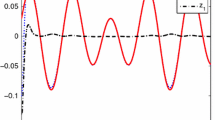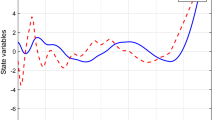Abstract
In this paper, the fault-tolerant control problem is addressed for high-speed trains with unknown time-varying system parameters, traction system actuator faults and disturbances. To represent the unknown time-varying system parameters in mathematical form, a new piecewise time-varying indicator including commonly used 0–1 case, is employed, which results in a piecewise time-varying nonlinear model with some unknown parameters and piecewise disturbances. For the healthy system with the time-varying indicator in the unknown forms and having known switching time instants, an adaptive backstepping controller is proposed to deal with the unknown system parameters and disturbances and achieve the position tracking. Further, the adaptive backstepping based fault-tolerant controller with adaptive laws is developed to guarantee the system states boundedness and the position tracking, in the presence of unknown actuator faults. Based on Lyapunov function, the stability of the closed-loop system is proved. Simulation studies on CRH2 (China Railway High-speed Train II) verify the performance of the proposed fault-tolerant control scheme.
Similar content being viewed by others
References
Q. Song, Y. D. Song, T. Tang, and B. Ning, “Computationally inexpensive tracking control of high-speed trains with traction/braking saturation,” IEEE Trans. on Intelligent Transportation Systems, vol. 12, no. 4, pp. 1116–1125, December 2011.
Z. Mao, Y. Wang, B. Jiang, and G. Tao, “Fault diagnosis for a class of active suspension systems with dynamic actuators’ faults,” International Journal of Control, Automation, and Systems, vol. 14, no. 5, pp. 1160–1172, October 2016.
Q. Song and Y. D. Song, “Data based fault-tolerant control of high speed trains with traction/braking notch nonlinearities and actuator failures,” IEEE Trans. on Neural Network, vol. 22, no. 12, pp. 2250–2261, December 2011.
H. Chen, B. Jiang, N. Lu, and Z. Mao, “Deep PCA based real-time incipient fault detection and diagnosis methodology for electrical drive in high-speed trains,” IEEE Trans. on Vehicular Technology, vol. 67, no. 6, pp. 4819–4830, 2018.
H. Chen, B. Jiang, N. Lu, “A multi-mode incipient sensor fault detection and diagnosis method for electrical traction systems,” International Journal of Control, Automation and Systems, vol. 16, no. 4, pp. 1783–1793, 2018.
H. Dong, B. Ning, B. Cai, and Z. Hou, “Automatic train control system development and simulation for high-speed railways,” IEEE circuits and systems magazine, vol. 10, no. 2, pp. 6–18, May 2010.
S. Gao, H. Dong, Y. Chen, B. Ning, G. Chen, and X. Yang, “Approximation-based robust adaptive automatic train control: an approach for actuator saturation,” IEEE Trans. on Intelligent Transportation Systems, vol. 14, no. 4, pp. 1733–1742, June 2013.
S. Gao, H. Dong, B. Ning, Y. Chen, and X. Sun, “Adaptive fault-tolerant automatic train operation using RBF neural networks,” Neural Computing and Applications, vol. 26, no. 1, pp. 141–149, January 2015.
X. Zhuan and X. Xia, “Optimal scheduling and control of heavy trains equipped with electronically controlled pneumatic braking systems,” IEEE Trans. on Control Systems Technology, vol. 15, no. 6, pp. 1159–1166, November 2007.
X. Zhuan and X. Xia, “Speed regulation with measured output feedback in the control of heavy haul trains,” Automatica, vol. 44, no. 1, pp. 242–247, January 2008.
M. Blanke, M. Kinnaert, J. Lunze, and M. Staroswiecki, Diagnosis and Fault-tolerant Control, Springer Verlag, Berlin, Heidelberg, 2003.
B. Huo, S. Tong, and Y. Li, “Observer-based adaptive fuzzy fault-tolerant output feedback control of uncertain nonlinear systems with actuator faults,” International Journal of Control, Automation and Systems, vol. 10, no. 6, pp. 1119–1128, December 2012.
Z. Zuo, D. W. C. Ho, and Y. Wang, “Fault tolerant control for singular systems with actuator saturation and nonlinear perturbation,” Automatica, vol. 46, no. 3, pp. 569–576, March 2010.
Q. Shen, B. Jiang, and P. Shi, “Active fault-tolerant control against actuator fault and performance analysis of the effect of time delay due to fault diagnosis,” International Journal of Control, Automation and Systems, vol. 15, no. 2, pp. 537–546, April 2017.
Q. Shen, B. Jiang, P. Shi, and C.-C. Lim, “Novel neural networks-based fault tolerant control scheme with fault alarm,” IEEE Trans. on Cybernetics, vol. 44, no. 11, pp. 2190–2201, November 2014.
R. Wang and J. M. Wang, “Passive actuator fault-tolerant control for a class of overactuated nonlinear systems and applications to electric vehicles,” IEEE Trans. on Vehicular Technology, vol. 62, no. 3, pp. 972–985, March 2013.
S. Yin, H. Luo, and S. X. Ding. “Real-time implementation of fault-tolerant control systems with performance optimization,” IEEE Trans. on Industrial Electronics, vol. 61, no. 5, pp. 2402–2411, July 2014.
Q. Song, Y. Song, and W. Cai, “Adaptive backstepping control of train systems with traction/braking dynamics and uncertain resistive forces,” Vehicle System Dynamics, vol. 49, no. 9, pp. 1441–1454, September 2011.
B. Jiang, Z. F. Gao, P. Shi, and Y. F. Xu, “Adaptive fault-tolerant tracking control of near-space vehicle using Takagi-Sugeno fuzzy models,” IEEE Trans. on Fuzzy System, vol. 18, no. 5, pp. 1000–1007, July 2010.
G. Zhang, H. Zhang, X. Huang, J. Wang, H. Yu, and R. Graaf, “Active fault-tolerant control for electric vehicles with independently driven rear in-wheel motors against certain actuator faults,” IEEE Trans. Control Systems Technology, vol. 24, no. 5, pp. 1557–1572, December 2016.
Y. Song, Q. Song, and W. Cai, “Fault-tolerant adaptive control of high-speed trains under traction/braking failures: a virtual parameter-based approach,” IEEE Trans. on Intelligent Transportation Systems, vol. 15, no. 2, pp. 737–748, April 2014.
X. M. Yao, L. G. Wu, and L. Guo, “Disturbance-observer-based fault tolerant control of high-speed trains: a Markovian jump system model approach,” IEEE Trans. on Systems, Man, and Cybernetics: Systems, 2018. DOI.https://doi.org/10.1109/TSMC.2018.2866618
X. M. Yao, J. H. Park, H. R. Dong, L. Guo, and X. Lin, “Robust adaptive nonsingular terminal sliding mode control for automatic train operation,” IEEE Transactions on Systems, Man, and Cybernetics, 2018. DOI.https://doi.org/10.1109/TSMC.2018.2817616
X. Lin, H. Dong, X. Yao, and W. Bai, “Neural adaptive fault-tolerant control for high-speed trains with input saturation and unknown disturbance,” Neurocomputing, vol. 260, pp. 32–42, October 2017.
Z. Mao, G. Tao, B. Jiang, and X.-G. Yan, “Adaptive compensation of traction system actuator failures for highspeed trains,” IEEE Trans. on Intelligent Transportation Systems, vol. 18, no. 11, pp. 2950–2963, November 2017.
G. Tao, S. M. Joshi, and X. L. Ma, “Adaptive state feedback and tracking control of systems with actuator failures,” IEEE Trans. on Automatic Control, vol. 46, no. 1, pp. 78–95, January 2001.
Y. Chen and J. M. Wang, “Adaptive vehicle speed control with input injections for longitudinal motion independent road frictional condition estimation,” IEEE Trans. on Vehicular Technology, vol. 60, no. 3, pp. 839–848, November 2011.
G. Tao, S. H. Chen, and S. M. Joshi, “An adaptive control scheme for systems with unknown actuator failures,” Automatica, vol. 38, no. 6, pp. 1027–1034, June 2002.
S. Chen, G. Tao, and S. M. Joshi, “On matching conditions for adaptive state tracking control of systems with actuator failures,” IEEE Trans. on Automatic Control, vol. 47, no. 3, pp. 473–478, March 2002.
B. Jiang, J. L. Wang, and Y. C. Soh, “An adaptive technique for robust diagnosis of faults with independent effects on system outputs,” International Journal of Control, vol. 75, no. 11, pp. 792–802, 2002.
B. P. Rochard and F. Schmid, “A review of methods to measure and calculate train resistances,” Proc. of the Institution of Mechanical Engineers, Part F: Journal of Rail and Rapid Transit, vol. 214, no. 4, pp. 185–199, July 2000.
S. G. Zhang, Fundamental Application Theory and Engineering Technology for Railway High-Speed Trains, Beijing, China: Science Press, 2007.
H. Shen, L. Su, Z. G. Wu, and J. H. Park, “Reliable dis-sipative control for Markov jump systems using an event-triggered sampling information scheme,” Nonlinear Analysis: Hybrid Systems, vol. 25, pp. 41–59, August 2017.
J. Wang, K. Liang, X. Huang, Z. Wang, and H. Shen, “Dissipative fault-tolerant control for nonlinear singular perturbed systems with Markov jumping parameters based on slow state feedback,” Applied Mathematics and Computation, vol. 328, pp. 247–262, July 2018.
Author information
Authors and Affiliations
Corresponding author
Additional information
Recommended by Editor Jessie (Ju H.) Park. This work was supported in part by the National Natural Science Foundation of China under Grant 61490703, and Grant 61573180, in part by the Project through the Priority Academic Program Development of Jiangsu Higher Education Institutions, in part by Qing Lan Project, and in part by the Fundamental Research Funds for the Central Universities No. NE2019101.
Shangkun Liu received his B.S. degrees in Automation Engineering from Nanjing University of Aeronautics and Astronautics, China, in 2016. He is currently pursuing a Ph.D. degree from the College of Automation Engineering in Nanjing University of Aeronautics and Astronautics, Nanjing, China. His current research interests include fault diagnosis and fault-tolerant control with faults and disturbances, and their applications in high-speed trains.
Bin Jiang obtained his Ph.D. degree in Automatic Control from Northeastern University, Shenyang, China, in 1995. He had ever been postdoctoral fellow, research fellow and visiting professor in Singapore, France, USA and Canada, respectively. Now he is a Chair Professor of Cheung Kong Scholar Program in Ministry of Education and Vice President of Nanjing University of Aeronautics and Astronautics, China. He won the second class Prize of National Natural Science Award of China. He currently serves as Associate Editor or Editorial Board Member for a number of journals such as IEEE Trans. On Control Systems Technology; IEEE Trans. On Fuzzy Systems; Int. J. of Control, Automation and Systems; Nonlinear Analysis: Hybrid Systems; Acta Automatica Sinica; Systems Engineering and Electronics Technologies. He is Chair of Control Systems Chapter in IEEE Nanjing Section, a member of IFAC Technical Committee on Fault Detection, Supervision, and Safety of Technical Processes. His research interests include fault diagnosis and fault tolerant control and their applications in aircrafts, satellites and high-speed trains.
Zehui Mao received her Ph.D. degree in Control Theory and Control Engineering from Nanjing University of Aeronautics and Astronautics, Nanjing, China, in 2009. She is now an associate professor at the College of Automation Engineering in Nanjing University of Aeronautics and Astronautics, China. And she is now a visiting scholar in University of Virginia. She worked in the areas of fault diagnosis, with particular interests in nonlinear control systems, sampled-data systems and networked control systems. Her current research interests include fault diagnosis and fault-tolerant control of systems with disturbance and incipient faults, and high speed train and spacecraft flight control applications.
Steven X. Ding received his Ph.D. degree in electrical engineering from the Gerhard-Mercator University of Duisburg, Germany, in 1992. From 1992 to 1994, he was a R&D engineer at Rheinmetall GmbH. From 1995 to 2001, he was a professor of control engineering at the University of Applied Science Lausitz in Senftenberg, Germany, and served as vice president of this university during 1998–2000. He is currently a full professor of control engineering and the head of the Institute for Automatic Control and Complex Systems (AKS) at the University of Duisburg-Essen, Germany. His research interests are model-based and data driven fault diagnosis, fault tolerant systems, real-time control, and their application in industry with a focus on automotive systems and chemical processes.
Rights and permissions
About this article
Cite this article
Liu, S., Jiang, B., Mao, Z. et al. Adaptive Backstepping Based Fault-tolerant Control for High-speed Trains with Actuator Faults. Int. J. Control Autom. Syst. 17, 1408–1420 (2019). https://doi.org/10.1007/s12555-018-0703-8
Received:
Revised:
Accepted:
Published:
Issue Date:
DOI: https://doi.org/10.1007/s12555-018-0703-8




